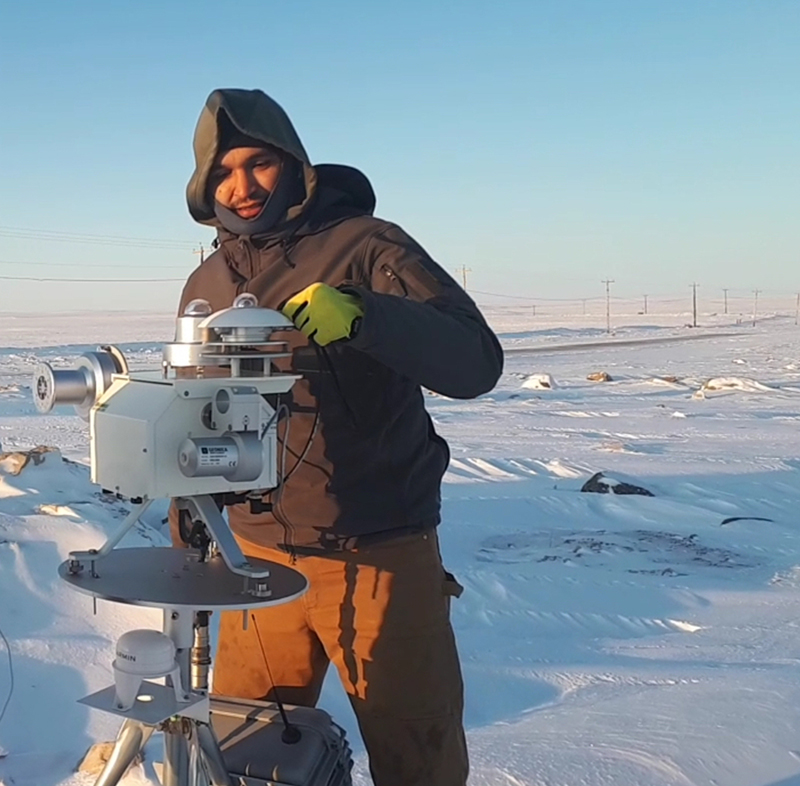Clean energy for the North: POLAR, National Research Council and Natural Resources Canada collaborate

Bryan Vandenbrink, a Science Ranger with Polar Knowledge Canada, adjusts a solar tracker at the Canadian High Arctic Research Station campus in Cambridge Bay, Nunavut. This instrument measures the amount of sunlight and tracks the sun throughout the day, producing information needed for developing of solar energy projects in the community.
Northern communities want to depend less on fossil fuels, especially diesel-powered generators and oil-burning furnaces. This means adopting new technology – but much of that technology has not been designed for arctic conditions. Polar Knowledge Canada (POLAR) is working with the National Research Council (NRC) and Natural Resources Canada (NRCan) to test clean-energy technologies in the Arctic and determine how they can help meet the needs of Arctic communities.
Working with POLAR offers big advantages to NRC and NRCan. They, like several other federal government agencies, have northern programs with expert researchers, but no laboratories in the North. That makes their arctic research very expensive and logistically challenging. POLAR, based at the Canadian High Arctic Research Station (CHARS) campus in Cambridge Bay, Nunavut, has sophisticated laboratories and other facilities as well as technical, northern, and remote community expertise. The agency welcomes research partnerships with federal government organizations whose research priorities complement its own. Clean energy is a priority for POLAR, as it is for NRC and NRCan.
POLAR is working with NRCan to evaluate Cambridge Bay’s suitability for wind and solar projects, and to find out how a remote northern community can incorporate renewable energy into its electricity grid. This involves monitoring wind speeds and hours of sunlight in Cambridge Bay – this contributes to NRCan’s national renewable energy mapping program – and collecting data on electricity use patterns, using Smart Meters installed in several high-energy-use commercial units. The data will show how well energy demand cycles correspond with the times when solar and wind power are available. POLAR is also working with NRCan to evaluate the performance of experimental solar panels mounted on the CHARS Main Research Building, and is facilitating NRCan’s monitoring of a Gwich’in Tribal Council solar array near Inuvik, Northwest Territories.
With the National Research Council, POLAR is testing small wind turbines in arctic conditions. Like other clean-energy technology, wind turbines have been engineered for southern conditions, and often do not perform well in the extreme cold and high winds of the Arctic. This project will determine what modifications turbines may need in order to provide dependable power for Arctic communities.
Tides can be a reliable and predictable source of energy for some coastal Arctic communities. POLAR is supporting NRC research to assess which Nunavut communities offer the best potential for tidal power.
The two agencies are also addressing another priority of northern communities: reducing the environmental impact of household waste and wastewater. They are testing a Bioelectrochemical Anaerobic Sewage Treatment (BeAST) reactor, which can produce heat, and potentially bio-fuel, from sewage. This could eventually mean cleaner wastewater entering sewage lagoons, with energy generated as a byproduct.
POLAR and NRC are evaluating the Arctic performance of heat and energy recovery ventilators, which improve household air quality by providing a continuous supply of fresh air while reducing heat and energy losses. NRC and POLAR are testing these devices at the CHARS campus and in several houses in Cambridge Bay.
These successful and growing collaborations between POLAR, NRCan, and NRC are helping lay the groundwork for a shift toward clean energy in northern communities. They’re also demonstrating how a partnership with POLAR, with its northern location, technical facilities and expertise, and connections with northern Indigenous communities, can both facilitate and enrich the northern research projects of federal government agencies – for the benefit of northerners.
Contact us to learn more: info@polar-polaire.gc.ca